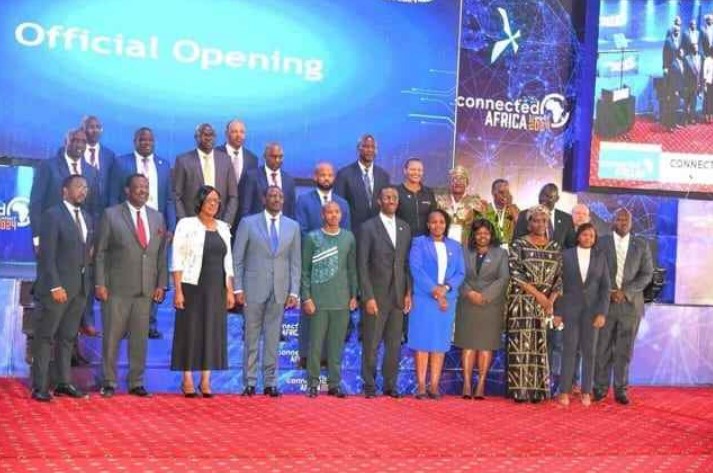
Today, President Ruto of Kenya officially kicked off the 2024 Connected Africa Summit at Uhuru Gardens in Nairobi.
This summit marks a significant milestone in shaping Africa’s digital economic trajectory, with a core emphasis on harnessing the power of technology and the continent’s youth to drive Africa towards a digitally empowered future.
Youth at the Center of Africa’s Digital Evolution
In his inaugural address, President Ruto underscored the pivotal role played by Africa’s youth in driving the continent’s digital transformation.
He hailed them as the primary architects and beneficiaries of technological progress, lauding their ingenuity and entrepreneurial zeal.
Across sectors such as fintech, agri-tech, renewable energy, and digital services, these young talents are spearheading innovations crucial for Africa’s development and resilience.
President Ruto remarked, “Their innovative endeavors are not only shaping the global tech landscape but also positioning Africa as an indispensable hub of technological ingenuity.”
He stressed the integral role of technology in daily life, emphasizing its significance not only for economic advancement but also as a key instrument for addressing contemporary challenges.
Addressing the Digital Disparity
Despite the positive outlook, President Ruto underscored the prevalent challenges hindering comprehensive digital inclusion.
Africa, with a population of 1.4 billion, struggles with a mere 36 percent internet penetration rate, highlighting a significant connectivity gap.
President Ruto expressed apprehension regarding the current developmental pace, which fails to meet the escalating demands of the workforce and future needs.
He highlighted the striking disparity in fixed broadband penetration, currently hovering around 5 percent, significantly lower than other global regions.
In response, the summit is committed to establishing a robust framework for connectivity, aimed at empowering the continent to fulfill the United Nations Sustainable Development Goals and the African Union’s Agenda 2063.
Fostering Economic Expansion Through Digital Integration
Within the framework of the African Continental Free Trade Area (AfCFTA), there exists a targeted objective to elevate the collective GDP from $1.7 trillion to $2.5 trillion by 2030.
President Ruto stressed that realizing this aspiration demands resolute commitments to bridging the significant digital gap that hampers the continent’s economic potential.
“This ambition necessitates steadfast efforts to bridge the substantial digital gap impeding our continent’s economic growth,” he emphasized.
The President outlined a vision for narrowing this digital divide, encompassing initiatives such as bolstering connectivity, amplifying the ICT sector’s contribution to Africa’s GDP, and driving overall economic expansion.
These endeavors aim to enhance broadband accessibility, elevate service quality, and render them more affordable, consequently fostering job creation and poverty reduction.
Read Also:
OPPO Introduces Reno 11F 5G in Kenya; Full Details of Specifications and Price
iPhone Market Share Declines as Samsung, Xiaomi, Transsion Surge Ahead
Theme and Goals of the Connected Africa Summit
The Connected Africa Summit 2024, operating under the theme “Forging the Path to a Connected Africa: Unleashing Growth Beyond Connectivity,” stands as a premier international platform for key African policymakers and influencers.
Building upon the accomplishments of the preceding 14 years of the Connected Summit, which has convened top-tier global ICT leaders and policymakers, the event aims to cultivate inventive concepts and collaborations that harness technology to tackle regional challenges and opportunities.
Throughout the week-long summit, participants from across Africa and beyond will engage in dialogues anticipated to shape the trajectory of Africa’s digital economy.
The objective is not merely for Africa to catch up with global standards but to secure a leading role in technological innovation on the world stage.

